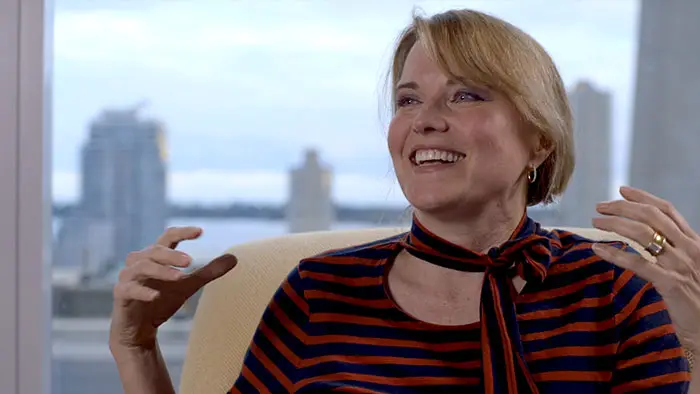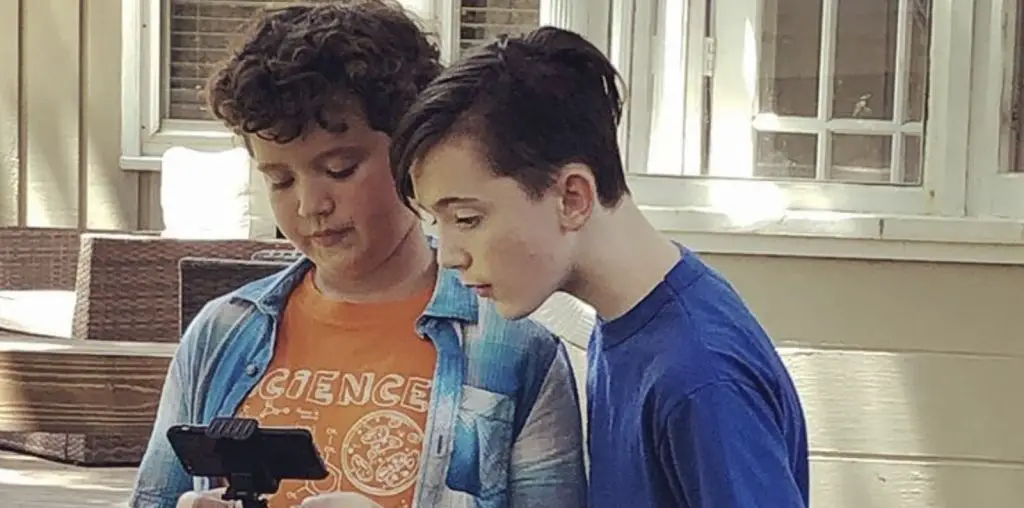
Queering the Script, by Gabrielle Zilkha, is a 2019 documentary about queer women representation on TV shows and how it is intrinsically linked with fans. It takes place during ClexaCon–the largest fandom event for LGBTQ+ women and allies–and features interviews with fans, creators, actors, critics, or other pop-culture and media history experts.
Zilkha’s documentary starts by telling us why this change and multitude of portrayals are so important for fans, as one proclaimed that “we starve for representation.” They construct their identities around the show they love, they feel good seeing themselves represented on screen, and validated knowing that “it is okay to be you.”
It is something particularly important for many queer fans who, sadly, are still not accepted by their family, friends, or society.
Queering the Script turned from an opening intro that could act as a promotional video for ClexaCon, to an explanation of “queer-nerd lexicon.” It very briefly retraces the steps that brought us here. We start back in 1995 with precursor shows, Xena (the ‘real Wonder Woman’ to many fans!), Ellen, Buffy, The L Word, to Carmilla, Wynonna Earps, and basically all the new-ish CW/Netflix queerness offerings, including The 100.
It is interesting from an outside perspective to learn about these new television shows that could easily be overlooked. They are not necessarily considered acclaimed or “prestige TV,” but they have a strong and devoted fandom, and then to discover the importance of this fandom.
“They construct their identities around the show they love, they feel good seeing themselves represented on screen, and validated knowing that ‘it is okay to be you.’”
The film’s participants then explain different opinions, good and bad, while voicing their concerns, frustrations, recommendations, and hopes. We learn about the pre-Facebook era genesis of “shipping” or “queershipping,” when fans used to go on message boards to create “slash-fictions.”
Queering the Script also tackles the various lesbian/bi stereotypes and the “bury your gays” trope. A trend that has queer characters (or POC for diversity!) dying horrifically or killed for shock value. A practice that started with the Hays Code (The Motion Picture Production Code) in the 1930s when there had to be “morally appropriate consequences” for all gays seen on screen (or comeuppance for queer acts or coming out…)
As noted by a showrunner after The Bloody Spring of 2016—in which a disproportionate amount of queer characters died on scripted television—it is demoralizing to see that these kinds of sad endings are still happening today for no reason!
Here and there, the documentary gets factual and interesting for viewers who hoped for something more concrete than fan testimonies. And so, these parts of Queering the Script could work as a less in-depth LGBTQ+ companion to Tom Donahue’s This Changes Everything, about gender disparity in Hollywood.
At some point, a report from GLAAD—the non-governmental media monitoring organization3demonstrates that, despite the scary time we’re living in for all minorities, things are getting better representation-wise. There have been an increase in positive role models, more non-binary and Bi+ characters (a number that is up for the first time also for Bi+ men), queer POC characters are outnumbering white ones, and trans characters (played by trans performers) numbers are up as well thanks to revolutionary shows like Pose and Transparent.
And all of this is also possible, in part, because of the diversity behind the camera. It is now impossible to avoid queer content, and there is something for everyone, from action superhero shows with Batwoman or Black Lightning, to high-end historical British drama with Gentleman Jack or A Very English Scandal. This combination of niche quality and quantity is possible because streaming platforms such as Netflix were at the forefront of this renaissance of sorts with Orange Is The New Black.
“…the documentary gets factual and interesting for viewers who hoped for something more concrete than fan testimonies.”
As we know, money is often the problem and the solution, thus in this age of “content overload” and diversifications, companies are willing to finance different kinds of projects and different folks!
As one industry interviewee mentioned, this is what makes all the difference, as decisions are taken in the writers’ room affect people all around the world. And, as access is as important as authenticity, this silver lining of the “streaming war” means platforms are taking risks so creators do not need to please advertisers anymore or appeal to the widest range of people as possible (which would include biased or homophobic persons for example…)
Queering the Script also wants to remind us that despite all this good news, within the community there is still a lack of representation as most LGBTQIA+ woman portrayals are of queer femme, from upper-middle-class or relatively wealthy backgrounds, and mainly with an able, model-like, white body.
However, Queering the Script unpacks a lot and it suffers for it. It does not flow well, going from one chapter to another interesting one, then interrupting it with a sequence that goes back to previous themes—all of which makes for an unnerving viewing. That could be due, to some extent, to the fact that it is enthusiastically edited, or effectively in a Prezi kind of way.
In addition, it often goes slightly off-topic especially when it concerns the Xenite Retreat. Learning about this annual Xena-themed weekend camp. Stories of fans finding like-minded loved ones, thanks to a show, might also be sweet, uplifting, and appropriately linked to the extreme fandom aspect—but the scenes filmed on-site are not really adding anything new to the story and felt more redundant than necessary.
The documentary has many weaknesses, but its strong nostalgic appeal and the more factual segments balance it out.
As a whole, Queering the Script is very targeted to the queer fan and geek communities. It would have been great to have something with a broader appeal to people who are willing to support their causes and understand their plights and this important part of the culture.

Queering the Script (2019) Directed by Gabrielle Zilkha. Queering the Script screened at the 2019 Outfest Los Angeles.
6 out of 10
"…“Despite the scary time we're living in for all minorities, things are getting better representation-wise...”"

